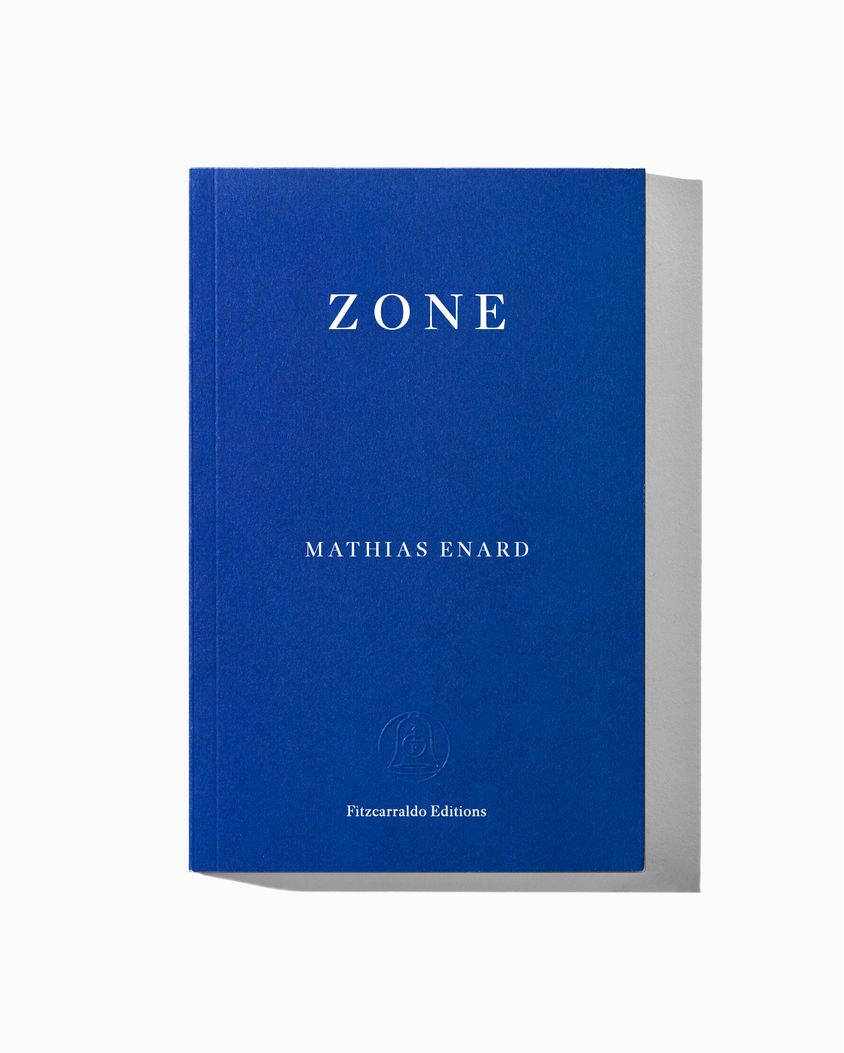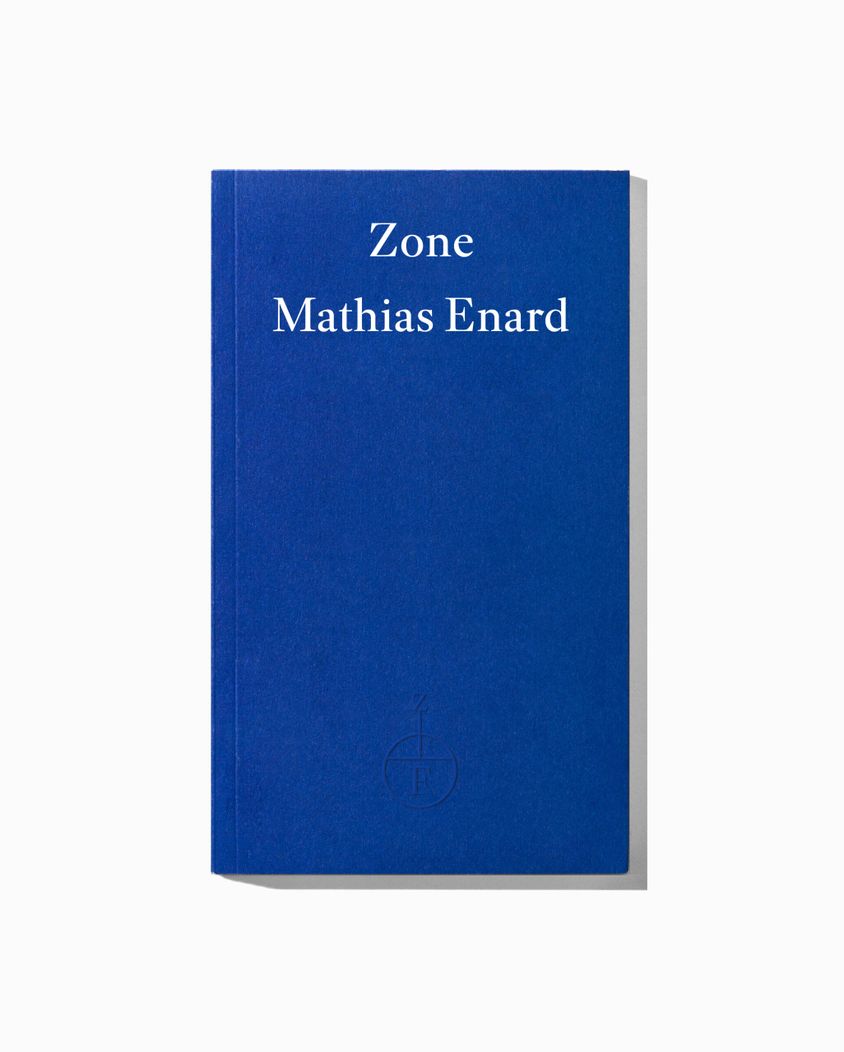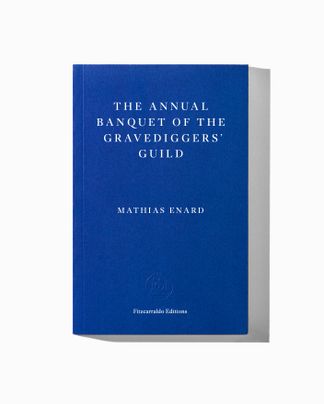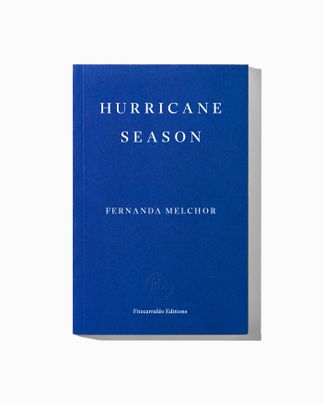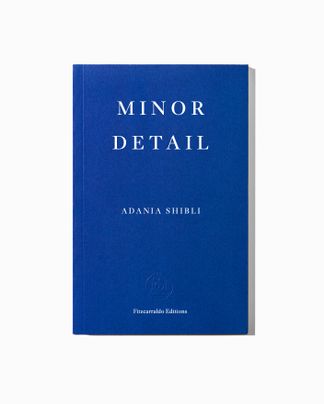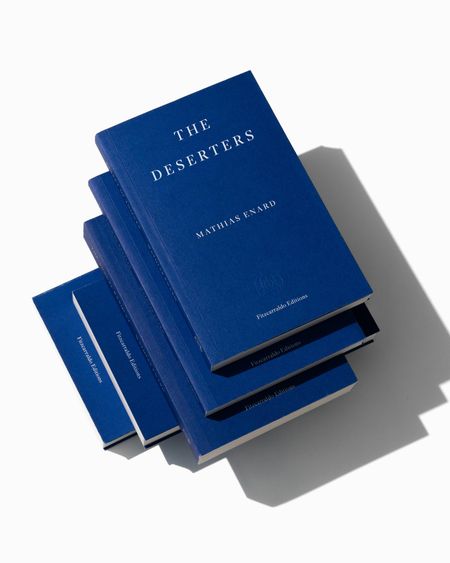Francis Mirković, a French Intelligence Services agent for fifteen years, is travelling first class on the train from Milan to Rome. Handcuffed to the luggage rack above him is a briefcase containing a wealth of information about the war criminals, terrorists and arms dealers of the Zone – the Mediterranean region, from Barcelona to Beirut, from Algiers to Trieste, which has become his speciality – to sell to the Vatican. Exhausted by alcohol and amphetamines, he revisits the violent history of the Zone and his own participation in that violence, beginning as a mercenary fighting for a far-right Croatian militia in the 1990s. One of the truly original books of the decade, and written as a single, hypnotic, propulsive, physically irresistible sentence, Mathias Enard’s Zone is an Iliad for our time, an extraordinary and panoramic view of violent conflict and its consequences in the twentieth century and beyond.
Zone
Translated by Charlotte Mandell
French paperback with flaps, 528 pages | Paperback, 496 pages
Published 20 August 2014
Zone
Translated by Charlotte Mandell
I.
everything is harder once you reach man’s estate, everything rings falser a little metallic like the sound of two bronze weapons clashing they make you come back to yourself without letting you get out of anything it’s a fine prison, you travel with a lot of things, a child you didn’t bear a little Czech crystal star a talisman beside the snow you watch melting, after the re-routing of the Gulf Stream prelude to the Ice Age, stalactites in Rome and icebergs in Egypt, it keeps raining in Milan I missed my plane I had 1,500 kilometers on the train ahead of me now I have six hundred still to go, this morning the Alps sparkled like knives, I was trembling with exhaustion in my seat couldn’t close my eyes like an aching drug addict, I talked to myself out loud on the train, or under my breath, I feel very old I want the train to go on go on let it go to Istanbul or Syracuse let it go to the end at least let it know how to go to the end of the journey I thought oh I should be pitied I took pity on myself on that train its rhythm opens your soul more deftly than a scalpel, I let everything flow by everything flees everything is more difficult these days along rail lines I’d like to let myself be led simply from one place to another as is logical for a passenger like a blind man led by the arm when he crosses a dangerous street but I’m just going from Paris to Rome, and to the main train station in Milan, to that Temple of Akhenaton for locomotives where a few traces of snow remain despite the rain I turn round and round, I look at the immense Egyptian columns supporting the ceiling, I have a little drink out of boredom, at a café overlooking the tracks the way others overlook the sea, it doesn’t do me any good it wasn’t the time for libations there are so many things that divert you from the path, that lead you astray and alcohol is one of them it makes the wounds deeper when you find yourself alone in an immense freezing train station obsessed by a destination that is in front of you and behind you at the same time: but a train isn’t circular, it goes from one point to another whereas I am in orbit I gravitate like a chunk of rock, I felt like a measly pebble when the man approached me on the platform, I know I attract madmen and deranged people these days they rush into my fragility they find a mirror for themselves or a companion in arms and that is truly crazy, priest of an unknown divinity he has an impish cap and a small bell in his left hand, he holds out his right hand and shouts in Italian “comrade one last handshake before the end of the world” I don’t dare shake it afraid he’s right, he must be forty, no older, and he has that keen prying gaze of fanatics who ask you questions because they’ve just discovered an instant brother in you, I hesitate before the outstretched arm terrified by that screwy smile and I answer “no thanks” as if he were selling me a newspaper or offering me a smoke, then the madman rings his bell and begins laughing in a big doleful voice and pointing at me with the hand he offered me, then he spits on the ground, moves away and an immense almost desperate solitude sweeps the platform at that moment I would give anything for arms or shoulders even the train taking me to Rome I would give up everything for someone to appear there and stand in the middle of the station, among the shadows, among the men without men the travelers clinging to their telephones and their suitcases, all these people about to disappear and give up their bodies during the brief digression that will take them from Milano Centrale to Fossoli Bolzano or Trieste, a long time ago at the Gare de Lyon a deranged mystic had also announced the end of the world to me and he was right, I had been split in two then in the war and crushed like a tiny meteor, the kind that have stopped shining in the sky, a natural bombshell whose mass according to astronomers is laughable, the madman in the Milan station reminds me of the gentle screwball in the Gare de Lyon, a saint, who knows, maybe it was the same man, maybe we grew at the same rhythm each on his own side in our respective madnesses and find each other on platform number 14 in the train station in Milan, a city with the predatory Spanish military name, perched on the edge of the plain like a glacial crust slowly vomited by the Alps whose peaks I saw, flint blades ripping the sky and setting the tone of the apocalypse confirmed by the demon with the bell in that sanctuary of progress that is the Stazione di Milano Centrale lost in time like me here lost in space in the elegant city, with a patch on my eye like Millán-Astray the one-eyed general, a bird of prey, feverish, ready to rip vibrant flesh to shreds as soon as the light of flight and danger is found again: Millán-Astray would so have liked Madrid to become a new Rome, he served the Iberian Franco Il Duce his bald idol in that great warring prelude to the 1940s, that one-eyed belligerent officer was a legionnaire he shouted viva la muerte a good military prophet, and he was right, the fugue of death would be played as far as Poland, would raise a tall wave of corpses whose foam would end up licking the shores of the Adriatic, in Trieste or in Croatia: I think about Millán-Astray and his argument with Unamuno strict high priest of culture while travelers hurry to the platform to take off for the end of the world and the train leading them straight there, Unamuno was such a classical and noble philosopher that he didn’t see the massacre on its way, he couldn’t admit that the one-eyed general was right when he shouted long live death in front of his flock for that hawk had sensed (animals tremble before the storm) that the carrion would increase and multiply, that death would enjoy years of plenty, before also ending up in a train, a train between Bolzano and Birkenau, between Trieste and Klagenfurt or between Zagreb and Rome, where time stopped, as it stopped for me on that platform lined with railway cars, furious, panting engines, a pause between two deaths, between the Spanish soldier and the train station with a similar name, as crushing as Ares god of war himself – I light a last cigarette mechanically I have to get ready for the journey, for moving like all the people pacing up and down the platform in Milano Centrale in search of a love, a gaze, an event that will tear them from the endless circling, from the Wheel, a meeting, anything to escape yourself, or vital business, or the memory of emotions and crimes, it is strange that there are no women on the platform at this precise moment, motivated by the memory of Millán-Astray and his bandaged eye I climb into the trans-Italian express that must have been the zenith of progress and technology ten years ago for its doors were automatic and it went faster than 200 kilometers per hour in a straight line on a good day and today, a little closer to the end of the world, it’s just a train: the same goes for all things like trains and cars, embraces, faces, bodies their speed their beauty or their ugliness seems ridiculous a few years later, once they’re putrid or rusty, once up the step now I’m in a different world, plush velour thickens everything, heat too, I left winter by getting into this train car, it’s a journey in time, it’s a day unlike the others, it’s a special day December 8th the day of the Immaculate Conception and I am missing the Pope’s homily on the Piazza di Spagna as a madman comes and announces the end of the world to me, I could have seen the pontiff one last time, seen the spiritual descendant of the first Palestinian leader the only one who got some results, but it wasn’t easy for that skinny whining Levantine who didn’t write a single line during his lifetime, outside on the next track a train is stopping and a pretty girl behind the window has intriguing eyes, I think she’s talking to someone I don’t see, she is very close to me actually a meter away at most we are separated by two dirtyish windows I have to be strong I can’t linger over the faces of young women I have to be resolute so I can gather momentum for the kilometers ahead of me then for the void and the terror of the world I’m changing my life my profession better not think about it, I placed the little suitcase over my seat and I discreetly handcuffed it to the luggage rack better close my eyes for a minute but on the platform policemen mounted on two-wheeled electric chariots like Achilles or Hector without a horse are chasing a young black man who’s running towards the tracks rousing surprise and concern among the travelers, blue angels, announcers of the Apocalypse maybe, astride a strange silent azure scooter, everyone gets out to take in the scene, Pallas Athena and the son of Tydeus rushing at the Trojans, a few dozen meters away from me one of the two policemen reaches the fugitive and with a gesture of rare violence aided by all the speed of his vehicle he hurls the man at bay up against one of the cement posts in the middle of the platform, the captive flattens against the concrete his head bangs into the column and he falls, he falls on his stomach right in the middle of the Milano Centrale station just in time for the second angel to jump on his back and immobilize him, sitting on his lower back the way a farmer or a wrangler ties up a fractious animal, then, back on his machine, he drags the criminal stumbling at the end of a chain to the admiring murmurs of the crowd, ancient scene of triumph, they parade the chained conquered ones behind the chariots of the conquerors, they drag them to the gaping galleys, the black man has a swollen face and a bloody nose his head held high a little incredulous everyone gets back into the car the incident is over justice has triumphed just a few minutes before departure, I glance at the suitcase, I’m afraid I won’t manage to sleep or I’ll be pursued as soon as I doze as soon as I lower my guard they’ll interfere with my sleep or get under my eyelids to raise them the way you open shutters or Venetian blinds, it’s been a long time since I thought of Venice, the green water by the Dogana, the fog of the Zattere and the intense cold when you look at the cemetery from the Fondamente Nuove, back from the war, hadn’t thought of the shadows, in Venice they’re made of wine and drunk in the winter starting at five o’clock in the evening, I see again the Slavic violinists who played for the Japanese, the French in full carnival masquerade, a rich hairdresser from Munich who bought himself a palace on the Grand Canal, and the train suddenly gets underway I lean my head back we’re off over 550 kilometers till the end of the world
(…)
‘[Zone is] an ambitious study of twentieth century conflict and disaster…. Enard does for the comma in Zone what Eimear McBride did for the full stop in A Girl is a Half-formed Thing, and just as McBride brought her writing a raw intensity and immediacy, Enard brings to his a similarly fierce political engagements and moral authority…. Enard’s novel is to be seen within a tradition of French avant-garde writing … The result is a modern masterpiece.’
— David Collard, Times Literary Supplement
‘[T]he brilliance of Zone lies in its brutal refusal to stop. Again and again, Mathias Enard’s white-knuckle narrative plunges us back into the battle-scarred past, forcing us to confront its horrors…. a relentlessly inventive novel.’
— David Winters, Literary Review
‘I haven’t read anything this worthy of publication in years, nor this stylistically and thematically interesting, this politically and literarily engaged, this exciting and gripping, this moving and heart-breaking and this – the real kicker given that Zone is a 521 page stream of consciousness – readable. Zone is as close to a flawless novel as I have encountered in a very, very, long time.’
— Scott Manley Hadley, The Triumph of the Now
‘[T]he material of a conventional thriller has been sublimated into an atmosphere of violence, power and cruelty; humanity here is little more than a vector through which various kinds of insanity flow.’
— Nicholas Lezard, Guardian
‘Zone … is a staggering literary achievement. A novel written on the grandest scale, with the ambition of creating a modernist prose epic with the scope of Homer or Ezra Pound’s Cantos, it is at once beautiful and encyclopaedic.’
— Thom Cuell, The Workshy Fop
‘Mathias Enard has found a way to restore death to life and life to death, and so joins the first rank of novelists, the bringers of fire, who even as they can’t go on, do.’
— Garth Risk Hallberg, The Millions
‘The novel of the decade, if not of the century.’
— Christophe Claro, translator of Thomas Pynchon
‘Zone is a major and compelling work, a work that will keep you in its grip from its first utterance to its last.’
— Brian Evenson, author of Last Days
‘Like Flaubert and James Joyce, Enard seems to have found a model for his omnivorous novel in the Homeric epic, while Ezra Pound’s ghost also haunts Zone…. Enard’s erudite and ambitious novel is … a Flaubertian encyclopaedia of our times at the end of a violent century.’
— Stephen Burn, New York Times
Mathias Enard, born in 1972, studied Persian and Arabic and spent long periods in the Middle East. He won several awards for Zone, including the Prix du Livre Inter and the Prix Décembre, and won the Liste Goncourt/Le Choix de l’Orient, the Prix littéraire de la Porte Dorée and the Prix du Roman-News for Street of Thieves. He won the 2015 Prix Goncourt, the 2017 Leipziger Book Award for European Understanding, the Premio Gregor von Rezzori and was shortlisted for the 2017 International Booker Prize for Compass.
Charlotte Mandell has translated fiction, poetry, and philosophy from the French, including works by Proust, Flaubert, Genet, Maupassant, Blanchot, and many other distinguished authors. She has received many accolades and awards for her translations, including a Literature Translation Fellowship from the National Endowment for the Arts for Zone, also by Mathias Enard.

